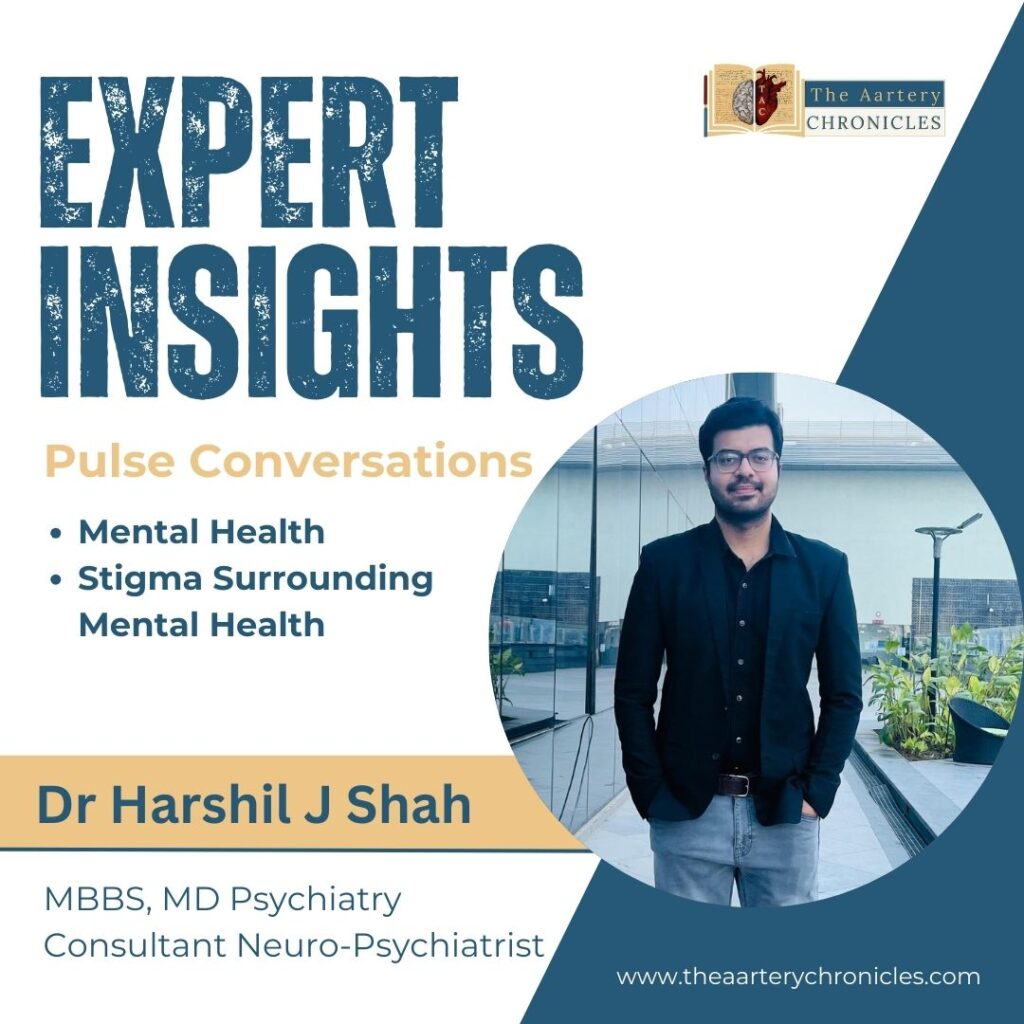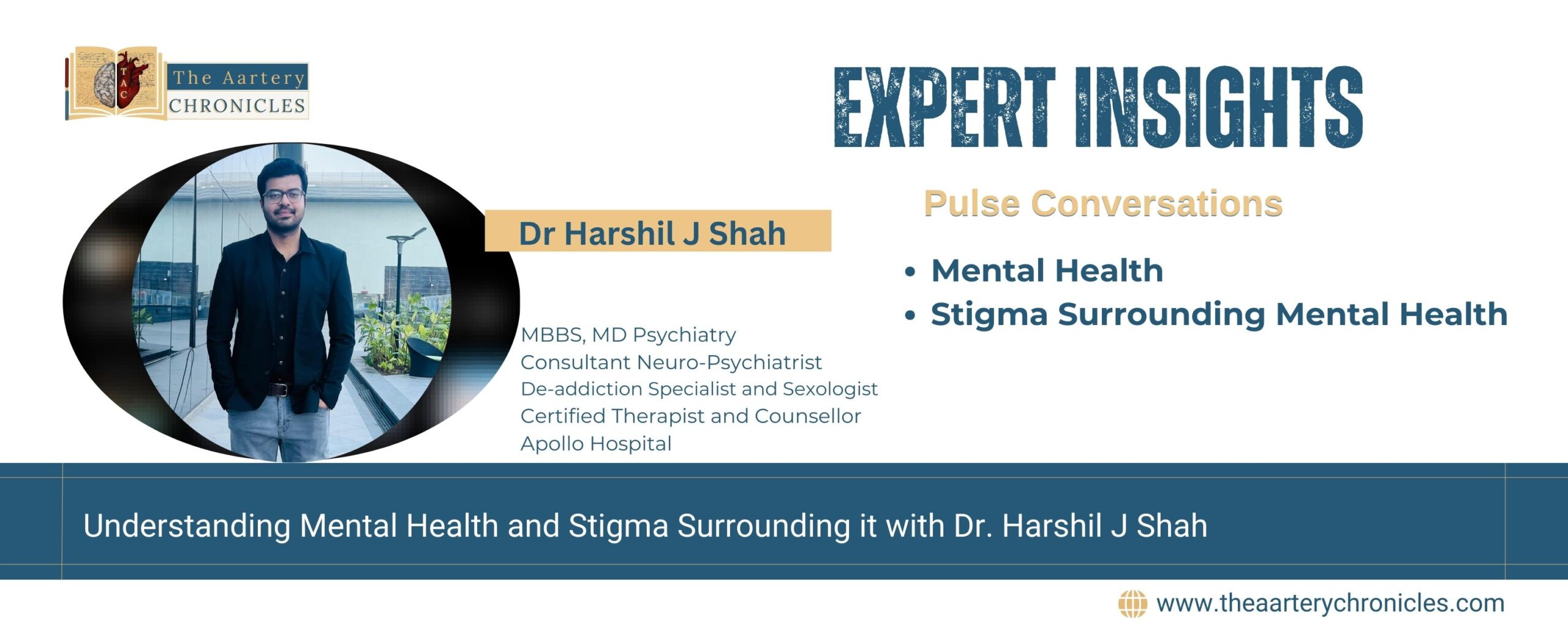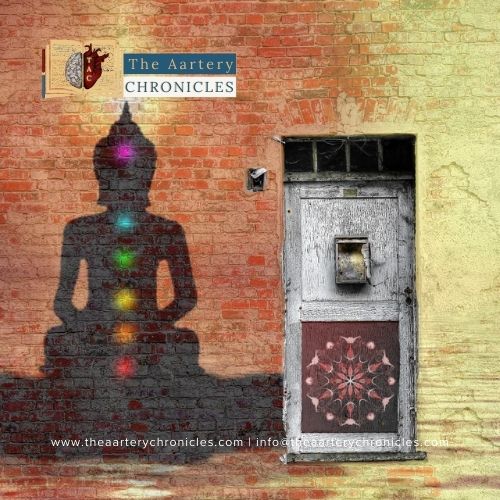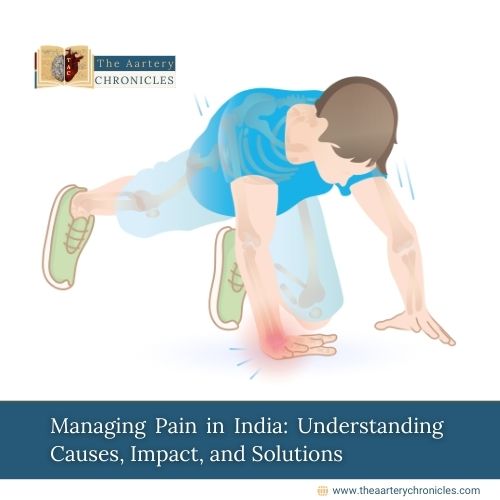

Understanding Mental Health and Stigma Surrounding it with Expert Dr. Harshil J Shah
Overview
Mental health is an integral part of our overall well-being, yet it is often clouded by stigma and misconceptions that prevent open discussions and access to care. Although society has made significant strides in recognizing the importance of mental health, deep-rooted stigma persists, fueled by fear, misunderstanding, and cultural biases.
This stigma not only discourages people from seeking help but also creates barriers to treatment, perpetuating a cycle of silence and shame. To truly support those struggling with mental health issues, it is crucial to address and dismantle these stigmas, fostering an environment where mental health is viewed and treated with the respect and understanding it deserves.
In a conversation with The Aartery Chronicles, Dr. Harshil J Shah, (MBBS, MD Psychiatry) an esteemed psychiatrist affiliated with Apollo Hospitals, delves into the broad spectrum of mental health, exploring the roots of stigma that surrounds it and the myths that perpetuate this stigma. He emphasizes the importance of dispelling these misconceptions and highlights the necessary steps to foster a more inclusive and supportive approach to mental health care.
Understanding Common Mental Health Disorders
Dr. Harshil J Shah provides an overview of common mental health disorders, highlighting their prevalence and distinguishing features. Here are some key disorders frequently encountered in clinical practice that can affect anyone:
• Adjustment Disorder
It is one of the most commonly encountered mental health conditions. Adjustment disorder arises in response to significant life stressors, such as
- A job change
- Breakup
- Poor exam performance
- The loss of a loved one.
Symptoms of Adjustment Disorder often include
- Mood swings
- Irritability
- Sleep disturbances
- Appetite changes
Typically, these symptoms appear within a few weeks of the stressor and resolve within 10 to 15 days, or a few weeks, as the individual adjusts to the new situation.
• Major Depressive Disorder (MDD)
Unlike adjustment disorder, which resolves within a few weeks, major depressive disorder requires symptoms to persist for at least 15 days for a diagnosis.
In addition to persistent irritability and mood sadness, major depressive disorder is characterized by severe symptoms such as
- Complete lack of sleep
- Significant changes in weight (either loss or gain)
- In severe cases, suicidal thoughts or wishes.
It affects daily functioning and requires more extensive treatment.
• Dysthymia (Persistent Depressive Disorder)
Dysthymia, or persistent depressive disorder, is characterized by
- Chronic, low-grade depression that lasts for at least two years.
- Individuals with dysthymia experience a continuous, underlying sadness while still managing their daily activities and relationships.
Dysthymia doesn’t impair the daily life activities as severely as major depressive disorder.
• Bipolar Disorder
Bipolar mood disorder is marked by alternating periods of depression and mania.
- During depressive episodes, individuals experience
- Significant mood reductions
- Decreased interaction
- Lack of interest in activities
- Conversely, manic episodes involve
- Elevated mood
- Excessive talkativeness
- Heightened energy
- Individuals may function well with minimal sleep
- Exhibit grandiose ideas
- Engage in impulsive behaviors like excessive spending or hyper-religiosity
• Schizophrenia
Schizophrenia is a psychotic disorder that profoundly alters an individual’s grasp on reality. It involves symptoms such as
- Hallucinations, where the person might hear voices or see things that aren’t real.
- Delusions are also common in schizophrenic individuals, which make them believe that events are specifically directed at them, that others are conspiring to harm them, or that their partner is unfaithful without any supporting evidence.
People with schizophrenia may display
- Disorganized behaviors, such as
- Talking to imaginary figures
- Pointing at non-existent objects
- They often struggle with self-care, which affects their personal hygiene and daily responsibilities.
These symptoms can greatly impair a person’s ability to function effectively in daily life.
• Obsessive-Compulsive Disorder (OCD)
Obsessive-Compulsive Disorder (OCD) is characterized by repetitive behaviors and intrusive thoughts.
- Individuals may engage in actions like repeatedly washing their hands out of a persistent fear of contamination, even after handling clean objects.
- They might also continually check things, such as whether a door is locked, driven by excessive doubt.
- Additionally, OCD often involves intrusive, unwanted thoughts—typically negative—that persistently disrupt a person’s mental state, causing significant distress.
• Anxiety Disorders
Anxiety disorders encompass conditions such as generalized anxiety disorder (GAD) and panic disorder.
- GAD is marked by persistent and excessive worry.
- Panic disorder is characterized by sudden and intense episodes of panic attacks. These attacks can occur unexpectedly, with symptoms such as
- Rapid breathing
- Trembling
- Increased heart rate
- Sweating
- A strong sense of impending doom.
While GAD involves ongoing anxiety about many things, panic disorder features acute, episodic bursts of extreme fear and physical symptoms.
• Post-Traumatic Stress Disorder (PTSD)
PTSD develops after exposure to a traumatic event and involves symptoms such as
- Flashbacks
- Nightmares
- Severe anxiety
- Avoidance of reminders of the trauma
It significantly impacts daily functioning and requires targeted therapeutic interventions.
• Addiction Issues
These concerns encompass substance abuse as well as behavioural addictions, such as screen addiction, which is becoming increasingly prevalent among teenagers and adults.
Overlap Between Neurological and Psychiatric Disorders
Dr. Harshil highlights that there is significant overlap between neurology and psychiatry, as many conditions can present symptoms that intersect both fields. For example,
- Dementia, which primarily involves memory loss, is a neurological condition that can later affect speech and other cognitive functions.
- Similarly, conditions like migraines, conversion disorders, and seizures also blur the lines between the two specialties.
Additionally, in diseases like Parkinson’s and dementia, psychotic symptoms such as talking to oneself, laughing inappropriately, and gesturing—behaviors often associated with conditions like schizophrenia—can emerge in later stages. These symptoms occur due to the impact on specific brain areas affected by the neurological condition, illustrating the interconnected nature of neurological and psychiatric illnesses.
Origins of Mental Health Stigma
Dr. Harshil J Shah explains that a major reason mental health stigma persists is the misconception that seeking psychiatric help equates to severe mental illness or “madness.” This perception is primarily driven by the narrow association of psychiatry with psychotic disorders like schizophrenia, which involve symptoms such as hallucinations, delusions, and erratic behaviour. However, these severe conditions represent only a small portion (about 10-20%) of the psychiatric spectrum.
He further elucidates that certain factors play crucial roles in shaping attitudes toward mental health such as
- Socioeconomic status
- Literacy levels
- Geographical location
In urban areas, increased awareness and acceptance have contributed to a gradual decline in mental health stigma. However, in rural and less educated communities, stigma around mental health remains a significant challenge, creating substantial barriers to accessing care.
Individuals are primarily reluctant to seek help due to
- Limited awareness
- Cultural taboos
- Lack of resources perpetuate misconceptions
The fear of being labeled as “crazy” or facing social ostracism often discourages people from reaching out for support, leaving many to struggle in silence. Dr. Shah emphasizes the importance of targeted education and outreach efforts in these communities to dismantle barriers. He also stresses the need to expand the public’s understanding of the full scope of psychiatric care.
The Impact of Self-Stigma on Mental Health
Dr. Harshil J Shah sheds light on the profound effects of self-stigma, which occurs when individuals internalize societal views about mental health. This internalized stigma often leads to denial and avoidance of seeking necessary help. Here’s a closer look at how self-stigma impacts mental health:
- Denial of Issues: People experiencing mental health challenges, such as depression or anxiety, may go into denial and refuse to acknowledge their symptoms. This denial is fueled by societal beliefs that seeking help signifies weakness.
- Masking Symptoms: Many individuals try to conceal their mental health issues driven by belief that showing weakness is unacceptable. This is particularly pronounced in professions perceived as strong or resilient, such as the military.
- Misconceptions of Strength: There is a prevalent belief that individuals should be able to overcome mental health issues through sheer willpower or personal strength, rather than seeking professional help. This misconception is reinforced by societal attitudes and advice from family and friends, who may suggest alternatives like yoga or meditation instead of proper medical treatment.
- Societal Pressure: Social expectations and pressure from family and friends contribute to self-stigma. For instance, in lower socioeconomic classes, there may be a dismissive attitude towards mental health issues, leading to advice such as “just get over it” or “stop thinking about it.
- Severe Consequences: Dr. Shah recounts cases where self-stigma has led to severe outcomes. For example, a young woman with deep depression and suicidal thoughts faced significant resistance from her family to seek treatment. Her condition worsened until she was finally admitted to a hospital, where she showed dramatic improvement.
- Confidentiality Concerns: The fear of social judgment and maintaining confidentiality also play a role in self-stigma. Many individuals are reluctant to seek help due to worries about others discovering their condition, which can further isolate them and exacerbate their mental health struggles.
Overall, self-stigma not only hinders individuals from seeking the help they need but also contributes to worsening their mental health and overall well-being. Addressing these internalized stigmas is crucial for improving mental health outcomes and encouraging more people to seek timely and appropriate care.
Conclusion
In conclusion, stigma surrounding mental health, including self-stigma, remains a significant barrier to seeking and receiving appropriate care. Self-stigma, driven by societal misconceptions and internalized negative beliefs, can prevent individuals from acknowledging their struggles and accessing necessary treatment. Commonly encountered mental health problems such as adjustment disorders, major depression, bipolar disorder, schizophrenia, OCD, and various anxiety disorders illustrate the complex nature of mental health challenges. To address these issues effectively, it is essential to promote greater awareness, reduce stigma, and provide supportive environments that encourage individuals to seek help without fear of judgment. By fostering understanding and compassion, we can improve mental health outcomes and support individuals in navigating their mental health journeys with dignity and resilience.









